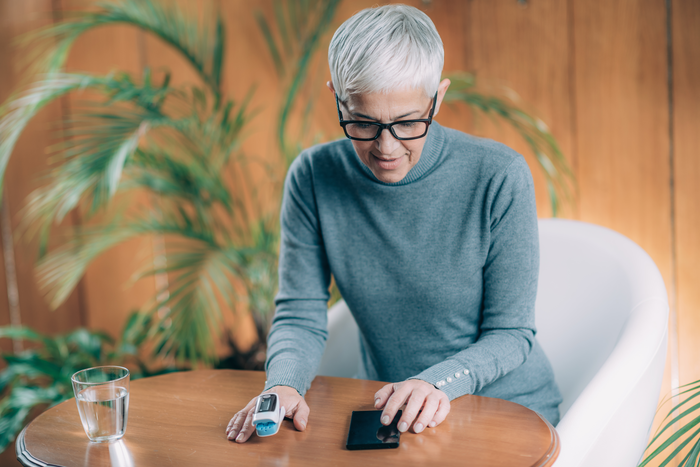May 10 2023, Utrecht (The Netherlands) – When corona patients themselves measure the oxygen level in their blood at home, this is well applicable through the general practice. This was shown in a study conducted by UMC Utrecht during the pandemic. The study showed that patients could easily perform the oxygen measurement themselves at home, they felt safe doing so and the number of GP or hospital visits did not increase. The researchers believe that – by enabling care close to home – patients experience more control and that it contributes to relieving caregivers and keeping healthcare affordable.

Credit: Getty Images, royalty free
May 10 2023, Utrecht (The Netherlands) – When corona patients themselves measure the oxygen level in their blood at home, this is well applicable through the general practice. This was shown in a study conducted by UMC Utrecht during the pandemic. The study showed that patients could easily perform the oxygen measurement themselves at home, they felt safe doing so and the number of GP or hospital visits did not increase. The researchers believe that – by enabling care close to home – patients experience more control and that it contributes to relieving caregivers and keeping healthcare affordable.
General practitioners (GPs) typically follow corona patients with moderate-to-severe symptoms closely to identify any deterioration in their condition in a timely manner. A key variable here is monitoring of blood oxygen levels. A sudden drop is an important sign of deterioration in the patient’s condition. But in some patients, low oxygen levels do not go hand in hand with shortness of breath, so they do not feel it themselves while an oxygen measurement will detect it.
Identifying and treating these patients early can provide important health benefits. Especially when they have an underlying condition with a higher risk of an unfavorable disease course. The home measurement of oxygen levels by the patient can help. Until now, there was no scientific evidence for this. Therefore, UMC Utrecht investigated the feasibility of home monitoring of corona patients by measuring oxygen saturation with a pulse oximeter (a medical measuring instrument that determines the oxygen level in the blood via a clip on a finger).
Well-controlled study
The study – published in the British Journal of General Practice (a professional journal for GPs) – focused on people aged 40 years and older with moderate-to-severe symptoms of COVID-19, with cardiovascular disease or risk factors, and in whom the GP considered careful follow-up desirable. In a controlled study of the feasibility of home oxygen saturation monitoring, participants were divided by lot into two groups. One half received a validated pulse oximeter on loan in addition to usual home health care, and the control group received usual home health care without a pulse oximeter. The first group was instructed to measure oxygen levels in their blood three times a day with the pulse oximeter. If saturation was less than 94 percent, they were to consult their GP.
Home monitoring well applicable
The study showed that the pulse oximeter was used by the almost all patients according to the instructions. An oxygen saturation of less than 94 percent was measured a total of 52 times, in ten patients. Six of them subsequently contacted their GP. Six weeks after the start of the study, there was no difference in recovery from corona infection between the intervention group and the control group. There was also no difference between the groups in terms of healthcare utilization such as GP contacts, hospital visits or hospitalization.
Lead researcher Dorien Zwart MD PhD (Julius Center for Health Sciences and Primary Care, UMC Utrecht) says: “This study is the first to examine home monitoring of high-risk patients with moderate-to-severe corona symptoms in a GP setting. The study shows that home monitoring in this group with risk factors such as cardiovascular disease using a validated oxygen meter in daily practice is readily applicable. Patients willingly cooperated in the study and were well able to comply with instructions. In addition, they felt safe to take control and perform the measurements themselves. Also, they did not contact their GP more often in response to an oxygen measurement as compared to the control group.”
Healthcare more personal and more affordable
Together with healthcare partners and patients, UMC Utrecht is developing (digital) initiatives that enable care closer to home. With this, care can be made even more personal and accessible: tailored to the individual patient as much as possible, and supported with apps where possible. On the benefits of care closer to home, Dorien says: “By enabling healthcare close to home, patients experience more personal control. And it also contributes to relieving the burden on our healthcare providers and keeping healthcare affordable.”
Publication
Smit K, Venekamp RP, Krol LA, Geersing G-J, Schoonhoven L, Kaasjager KAH, Rutten FH, Zwart DLM. Home monitoring by pulse oximetry of primary care patients with COVID-19: a pilot randomized trial. British Journal of General Practice 2023;73:e356-e363
Journal
British Journal of General Practice
DOI
10.3399/BJGP.2022.0224
Method of Research
Randomized controlled/clinical trial
Subject of Research
People
Article Title
Home monitoring by pulse oximetry of primary care patients with COVID-19: a pilot randomised controlled trial
Article Publication Date
27-Apr-2023
COI Statement
The authors have declared no competing interests.




